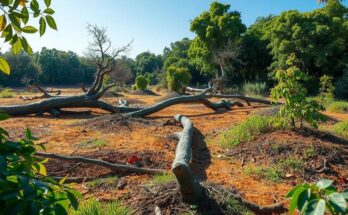Recent rapid advances by Syrian rebel forces have prompted Lebanon and Jordan to close their borders and Israel to strengthen its presence in the Golan Heights. These developments signal a significant challenge to President Bashar al-Assad’s regime as it loses control over key territories, including Deir al-Zour, which is now being contested by U.S.-backed Kurdish forces.
As the momentum of Syrian rebel forces accelerates, neighboring countries have reacted by tightening their border controls. On a recent Friday, rebel groups, primarily targeting the significant city of Homs, have moved decisively southward towards the Syrian capital, Damascus. This development, observed by both rebel factions and war monitoring organizations, signals an alarming shift in regional stability as the regime of President Bashar al-Assad continues to lose territory.
The rapid territorial gains of the resistance movement have instilled anxiety in surrounding nations. In response to potential instability stemming from Assad’s weakening authority, Lebanon and Jordan have opted to close their respective borders. Additionally, Israel has bolstered its military presence in the Golan Heights, indicating the escalating tensions along the border zones.
Moreover, a United States-backed Kurdish force is reportedly establishing a presence in Deir al-Zour, a city that had remained under government control. This maneuver represents another significant challenge to the power structure of Assad’s administration. The rebel coalition primarily comprises Hayat Tahrir al-Sham, a group that has previously sought legitimacy following its disaffiliation from Al Qaeda in 2016. However, it maintains a designation as a terrorist organization by authoritative bodies such as the United States and the United Nations.
Despite the current discourse around the conflicts in Gaza and Lebanon, the Syrian civil war persists, having entered a state of prolonged stalemate. Diplomatic initiatives aimed at achieving a political resolution have languished, allowing the violent struggle to continue unabated. The unfolding battlefield developments mark one of the most critical threats to Assad’s regime in recent years.
The ongoing Syrian civil war has seen multiple factions vying for power, with President Bashar al-Assad’s government facing increasing challenges to its authority. The rebel groups, united in their mission to dethrone Assad, have recently achieved significant territorial advances, particularly towards Damascus. This has profound implications not only for Syria’s internal dynamics but also for the geopolitical landscape in the Middle East, as neighboring nations remain vigilant against the repercussions of a collapsing regime.
In summary, the recent advances by Syrian rebel groups toward critical regions such as Homs and Damascus represent a significant escalation in the Syrian civil war. The consequent reaction from neighboring countries, including border closures and heightened military readiness, underscores the growing concern about regional stability amidst Assad’s diminishing control. This situation, compounded by involvement from international actors like the United States, signals a pivotal moment in the conflict, which has long been overshadowed by other regional crises.
Original Source: www.nytimes.com




